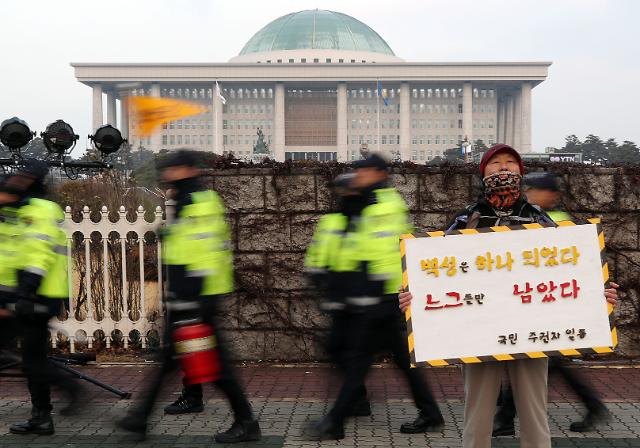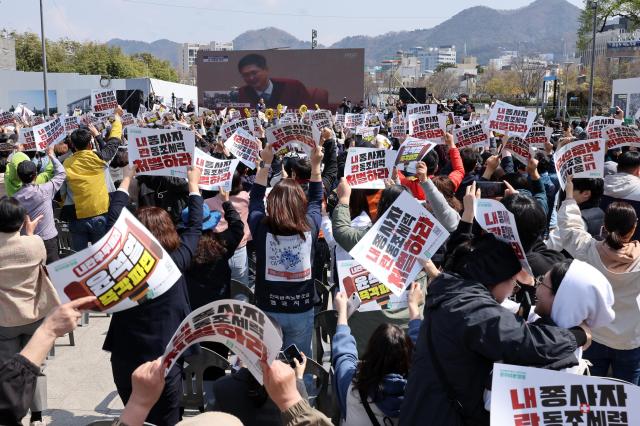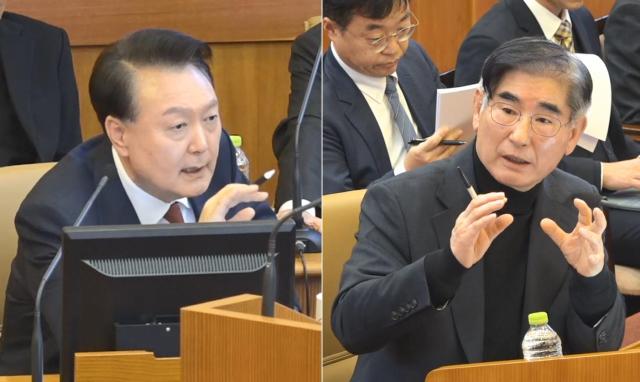
Riot police pass by a Seoul citizen staging a solo protest outside parliament.[Yonhap News Photo]
South Korea faces a historic day Friday for its democracy, waiting for a parliamentary vote to determine the fate of President Park Geun-hye who has resisted popular demands for her voluntary resignation to assume responsibility for a corruption scandal.
Protests are allowed only outside the parliamentary hall where lawmakers are to vote on a bill to impeach Park following a series of anti-government protests that have seen millions of citizens staging peaceful candle-lit rallies in an unprecedented demonstration of people power.
Since late October, the scandal has put South Korea into a political quagmire, paralyzing state affairs and aggravating economic woes. Many citizens have been left with a deep sense of malaise and frustration. But they now feel proud for opening a new chapter in South Korea's turbulent political history.
Young girls, high-school students, middle-aged citizens, housewives and their children carrying candles and paper placards have gathered for an orderly march near the heavily guarded presidential Blue House to press their demands for Park's ouster, showing a mature civic awareness.
Such a scene was unthinkable under the 18-year rule of President Park's father who seized power in a military coup in 1961. The late president, assassinated in 1979 by his intelligence chief, was credited with pioneering South Korea's rapid industrialization. At the same time, he was criticized for the brutal suppression of democracy.
Park, who took office in early 2013 as South Korea's first female president, has flatly refused to step down by herself, although she admitted she should be blamed for mismanagement. Her followers in parliament have insisted she should step down voluntarily by the end of April.
The impeachment motion requires approval from more than 200 lawmakers. The ruling Saenuri Party controls 128 seats in the 300-member National Assembly. If approved by parliament, the constitutional court will review it in a time-consuming process which may take up to six months.
In a recent survey, pollster Real Meter said 78.2 percent of voters supported Park's impeachment. Regardless of impeachment, however, many citizens are determined to oust Park for hurting South Korea's national image and creating an international ridicule.
If parliament endorses an impeachment bill, Park should stay away from all state affairs and relinquish her duty to the prime minister. That would be a second impeachment vote in parliament. In 2004, late president Roh Moo-hyun was impeached but the court turned it down.
The motion called for Park's impeachment for bribery and allowing her crony, Choi Soon-sil, to meddle in state affairs and extort money from conglomerates. Park was also accused of failing to protect the lives of the people on April 16, 2014, when a ferry packed with high-school students sank with the loss of more than 300 lives.
Despite her repeated denials, Park has been dogged by rumors that she was not in office for seven hours at that time for unspecified personal reasons.
If Park resigns, she could be potentially prosecuted because state prosecutors described her as an accomplice. An independent counsel has been appointed to lead a special counsel probe into Park's role in the scandal.
Aju news Lim Chang-won = cwlim34@ajunews.com
Copyright ⓒ Aju Press All rights reserved.





View more comments